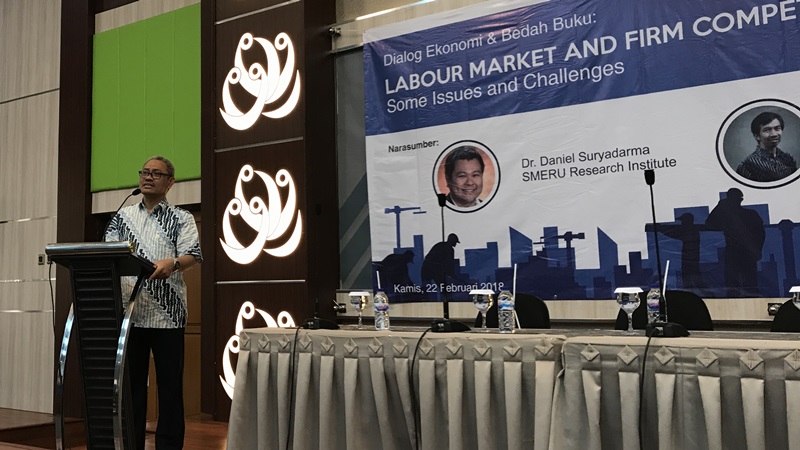ERIA and Universitas Brawijaya Hold 'The Indonesian Economy' Book Discussion
Date:
23 February 2018Category:
NewsTopics:
Finance and MacroeconomyShare Article:
Print Article:
Malang, 22 February 2018: The Economic Research Institute for ASEAN and East Asia (ERIA), together with the Faculty of Economics and Business, Universitas Brawijaya, held a dissemination event for The Indonesian Economy: Industrial and Trade Policy in Malang, Indonesia on 22 February 2018.
The Indonesian Economy: Industrial and Trade Policy, co-published by ERIA and Routledge, addressed the theme of how Indonesia should shape its trade and industrial policies in this new world trade environment.
Two contributors of the book talked about their chapters and answered questions from a room full of enthusiastic students. Dr Devanto Pratomo, Senior Lecturer and Researcher at Universitas Brawijaya, emphasised the need for Indonesia to make the most out of opportunities created by the demographic dividend by improving certainty in its labour market. He mentioned two possible solutions to foster more certainty in the labour market: applying similar treatment between permanent and contract workers; and implementing clearer regulations on outsourcing and fixed term contracting. Dr Pratomo suggested that these two points would improve workers' morale, which in the end would increase productivity due to fewer industrial conflict.
Dr Daniel Suryadarma, a Researcher at SMERU Research Institute, talked about the current education system in Indonesia. He stated that while school completion rates and education attainment have been increasing in Indonesia, the skills of Indonesian workers are still low compared to its neighbours and other comparable countries. Further, Dr Suryadarma emphasised the need to continuously invest in education and if possible to scale it up in order to intensify its effort in catching up with other countries.
In addition to the topics discussed during the event, the book also talks about the impact of local content requirements on Indonesia's manufacturing, FDI and value-added in Indonesia, as well as innovation in the manufacturing and services sectors. The main objective of the book is to convey two key messages. First, Indonesia should not limit itself to promoting only specific industries (by providing tax incentives or subsidies, or allocating large amount of national spending to develop particular industries) at the cost of other industries and inefficiency of resource allocation. Second, Indonesia should improve the basic condition for growth of all industries including infrastructure, the quantity and quality of workers, as well as access to finance, while at the same time implementing conducive trade and investment policies.
For trade practitioners, the book also introduces an evaluation of new trade instruments such as non-tariff measures like sanitary and phytosanitary measures (SPS), technical barriers to trade (TBT), export measures, and beyond border measures. Moreover, the book looks at industrial policies from a broader perspective such as investment, accessing inputs, labour, services, as well as research and innovation policies.








